7014ENG Project Management Practices: Lecture Capture Upgrade Project
VerifiedAdded on 2022/08/27
|7
|1416
|22
Report
AI Summary
This report provides a comprehensive analysis of a lecture capture upgrade project undertaken by an Australian University, examining the application of project management practices across the ten knowledge areas outlined in the PMBOK (Project Management Body of Knowledge). The project aimed to upgrade lecture capture facilities across five campuses, involving approximately 160 classrooms. The report highlights both successful and unsuccessful aspects of the project, including integration, scope, time, quality, risk, human resource, communication, procurement, and stakeholder management. The analysis reveals challenges in time management, risk mitigation, and quality control, while also acknowledging effective communication and stakeholder management. The report identifies key areas where the project manager and team could have improved their approach, emphasizing the importance of adhering to PMBOK guidelines for successful project outcomes. The case study underscores the need for project managers to possess relevant certifications and a strong understanding of all ten knowledge areas to drive projects towards their goals.
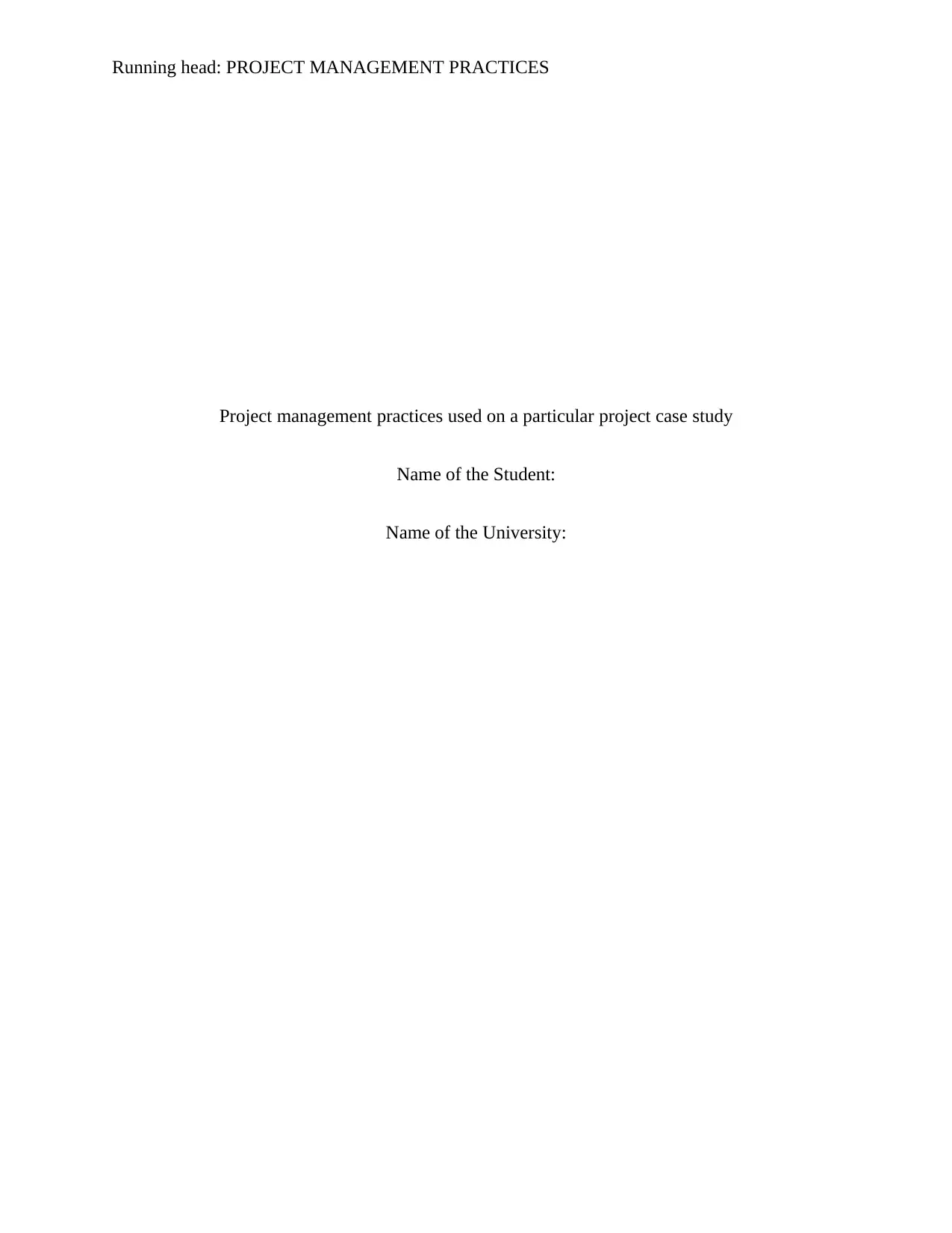
Running head: PROJECT MANAGEMENT PRACTICES
Project management practices used on a particular project case study
Name of the Student:
Name of the University:
Project management practices used on a particular project case study
Name of the Student:
Name of the University:
Paraphrase This Document
Need a fresh take? Get an instant paraphrase of this document with our AI Paraphraser
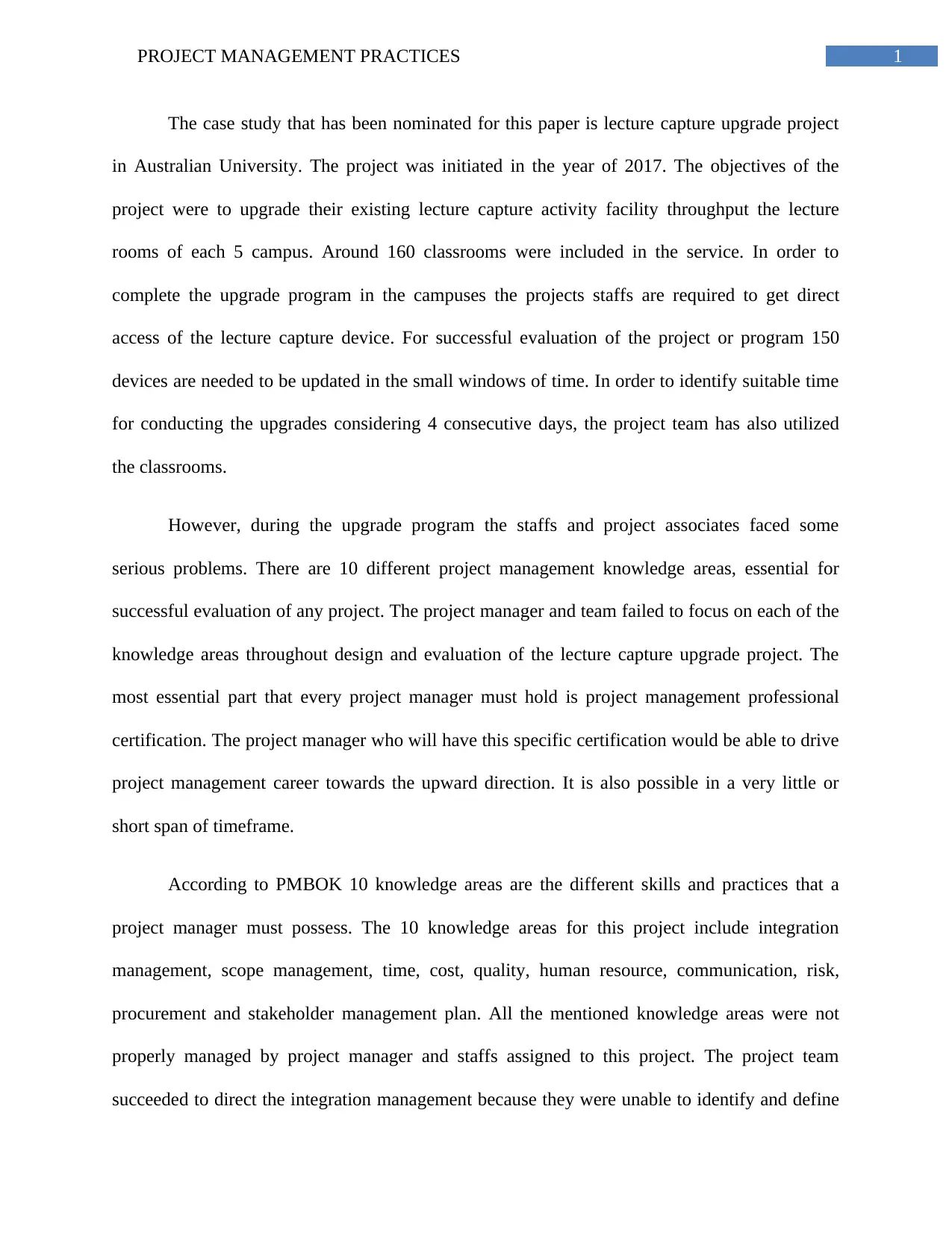
1PROJECT MANAGEMENT PRACTICES
The case study that has been nominated for this paper is lecture capture upgrade project
in Australian University. The project was initiated in the year of 2017. The objectives of the
project were to upgrade their existing lecture capture activity facility throughput the lecture
rooms of each 5 campus. Around 160 classrooms were included in the service. In order to
complete the upgrade program in the campuses the projects staffs are required to get direct
access of the lecture capture device. For successful evaluation of the project or program 150
devices are needed to be updated in the small windows of time. In order to identify suitable time
for conducting the upgrades considering 4 consecutive days, the project team has also utilized
the classrooms.
However, during the upgrade program the staffs and project associates faced some
serious problems. There are 10 different project management knowledge areas, essential for
successful evaluation of any project. The project manager and team failed to focus on each of the
knowledge areas throughout design and evaluation of the lecture capture upgrade project. The
most essential part that every project manager must hold is project management professional
certification. The project manager who will have this specific certification would be able to drive
project management career towards the upward direction. It is also possible in a very little or
short span of timeframe.
According to PMBOK 10 knowledge areas are the different skills and practices that a
project manager must possess. The 10 knowledge areas for this project include integration
management, scope management, time, cost, quality, human resource, communication, risk,
procurement and stakeholder management plan. All the mentioned knowledge areas were not
properly managed by project manager and staffs assigned to this project. The project team
succeeded to direct the integration management because they were unable to identify and define
The case study that has been nominated for this paper is lecture capture upgrade project
in Australian University. The project was initiated in the year of 2017. The objectives of the
project were to upgrade their existing lecture capture activity facility throughput the lecture
rooms of each 5 campus. Around 160 classrooms were included in the service. In order to
complete the upgrade program in the campuses the projects staffs are required to get direct
access of the lecture capture device. For successful evaluation of the project or program 150
devices are needed to be updated in the small windows of time. In order to identify suitable time
for conducting the upgrades considering 4 consecutive days, the project team has also utilized
the classrooms.
However, during the upgrade program the staffs and project associates faced some
serious problems. There are 10 different project management knowledge areas, essential for
successful evaluation of any project. The project manager and team failed to focus on each of the
knowledge areas throughout design and evaluation of the lecture capture upgrade project. The
most essential part that every project manager must hold is project management professional
certification. The project manager who will have this specific certification would be able to drive
project management career towards the upward direction. It is also possible in a very little or
short span of timeframe.
According to PMBOK 10 knowledge areas are the different skills and practices that a
project manager must possess. The 10 knowledge areas for this project include integration
management, scope management, time, cost, quality, human resource, communication, risk,
procurement and stakeholder management plan. All the mentioned knowledge areas were not
properly managed by project manager and staffs assigned to this project. The project team
succeeded to direct the integration management because they were unable to identify and define

2PROJECT MANAGEMENT PRACTICES
the project work at the initial stage. The changes those were expected to incorporate done
efficiently in other words, the team successfully integrated all useful changes to the lecture
capture upgrade project. Appropriate integration management includes scope, cost, and quality of
a project. Theses aspects or factors were not properly managed and operated by the project team
and manager.
The project scope is the other knowledge area that deals with scope, work breakdown
structure and project baseline. The project baseline was also not accurately managed by the team
and supervisor during design and upgrade of the lecture capture program. It defines the way
followed by which the project can be directed towards expected objectives, aim and goals. The
scope was prepared properly and completed respectively.
Time management is the other knowledge area which is estimated by the project
supervisor. The resources and project sequence is developed based on the project scope
statement. The schedule management plan helps monitoring and completing any project on time.
Initially it was estimated that the lecture capture upgrade project will be completed within 4
days. The project team has successfully utilized the booking system as well as class timetable for
identifying suitable time for conducting the upgrade in only 4 days. These 4 consecutive days
include weekend and selected exam timeframe as well. However, after certain progress it has
been determined that the project manager and team are not capable to complete the upgrade
program on time. Some of the staffs were requested to re-visit some classrooms on identified
weekends. However, they failed to do so, thus the time for the project was not managed
accurately.
the project work at the initial stage. The changes those were expected to incorporate done
efficiently in other words, the team successfully integrated all useful changes to the lecture
capture upgrade project. Appropriate integration management includes scope, cost, and quality of
a project. Theses aspects or factors were not properly managed and operated by the project team
and manager.
The project scope is the other knowledge area that deals with scope, work breakdown
structure and project baseline. The project baseline was also not accurately managed by the team
and supervisor during design and upgrade of the lecture capture program. It defines the way
followed by which the project can be directed towards expected objectives, aim and goals. The
scope was prepared properly and completed respectively.
Time management is the other knowledge area which is estimated by the project
supervisor. The resources and project sequence is developed based on the project scope
statement. The schedule management plan helps monitoring and completing any project on time.
Initially it was estimated that the lecture capture upgrade project will be completed within 4
days. The project team has successfully utilized the booking system as well as class timetable for
identifying suitable time for conducting the upgrade in only 4 days. These 4 consecutive days
include weekend and selected exam timeframe as well. However, after certain progress it has
been determined that the project manager and team are not capable to complete the upgrade
program on time. Some of the staffs were requested to re-visit some classrooms on identified
weekends. However, they failed to do so, thus the time for the project was not managed
accurately.
⊘ This is a preview!⊘
Do you want full access?
Subscribe today to unlock all pages.

Trusted by 1+ million students worldwide
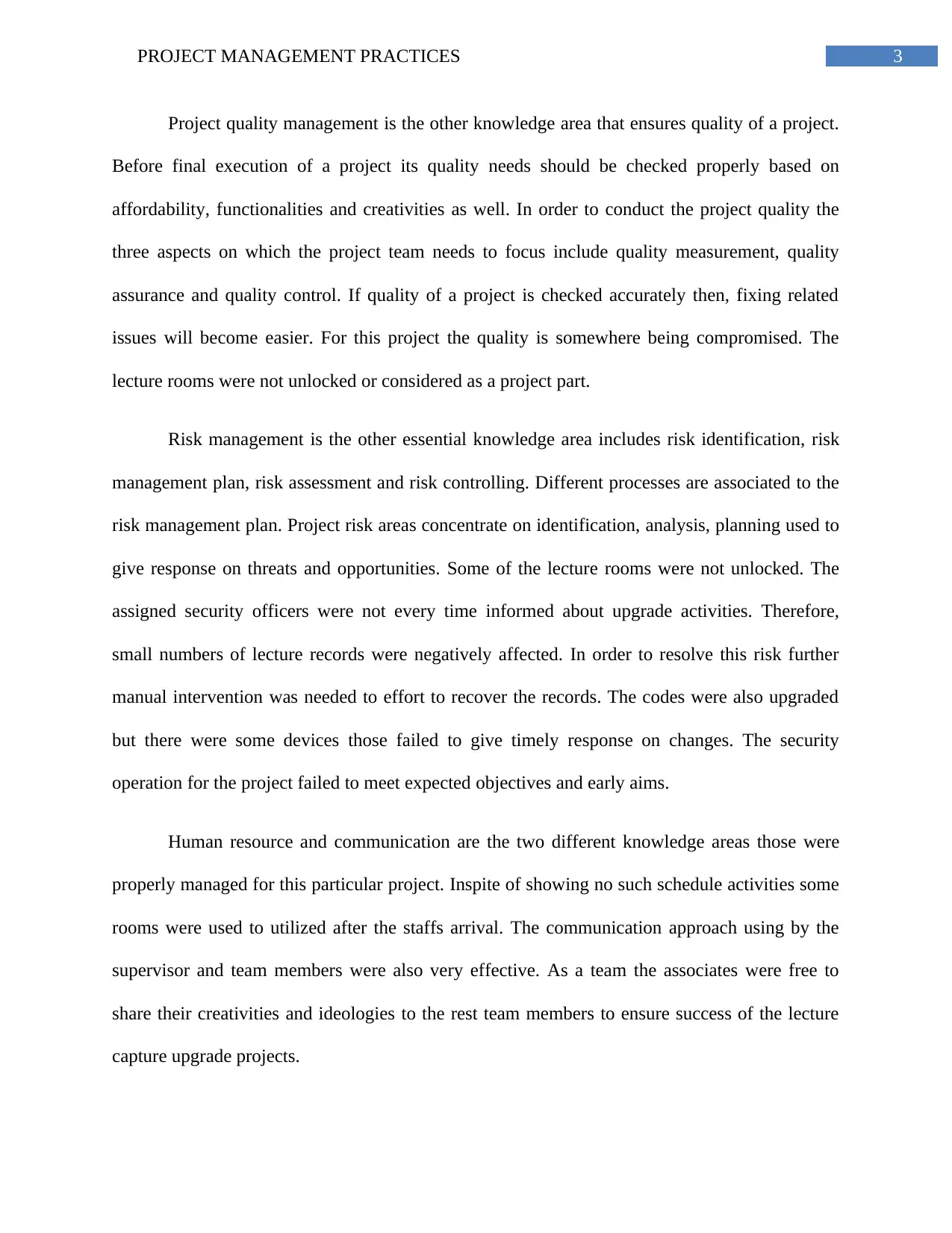
3PROJECT MANAGEMENT PRACTICES
Project quality management is the other knowledge area that ensures quality of a project.
Before final execution of a project its quality needs should be checked properly based on
affordability, functionalities and creativities as well. In order to conduct the project quality the
three aspects on which the project team needs to focus include quality measurement, quality
assurance and quality control. If quality of a project is checked accurately then, fixing related
issues will become easier. For this project the quality is somewhere being compromised. The
lecture rooms were not unlocked or considered as a project part.
Risk management is the other essential knowledge area includes risk identification, risk
management plan, risk assessment and risk controlling. Different processes are associated to the
risk management plan. Project risk areas concentrate on identification, analysis, planning used to
give response on threats and opportunities. Some of the lecture rooms were not unlocked. The
assigned security officers were not every time informed about upgrade activities. Therefore,
small numbers of lecture records were negatively affected. In order to resolve this risk further
manual intervention was needed to effort to recover the records. The codes were also upgraded
but there were some devices those failed to give timely response on changes. The security
operation for the project failed to meet expected objectives and early aims.
Human resource and communication are the two different knowledge areas those were
properly managed for this particular project. Inspite of showing no such schedule activities some
rooms were used to utilized after the staffs arrival. The communication approach using by the
supervisor and team members were also very effective. As a team the associates were free to
share their creativities and ideologies to the rest team members to ensure success of the lecture
capture upgrade projects.
Project quality management is the other knowledge area that ensures quality of a project.
Before final execution of a project its quality needs should be checked properly based on
affordability, functionalities and creativities as well. In order to conduct the project quality the
three aspects on which the project team needs to focus include quality measurement, quality
assurance and quality control. If quality of a project is checked accurately then, fixing related
issues will become easier. For this project the quality is somewhere being compromised. The
lecture rooms were not unlocked or considered as a project part.
Risk management is the other essential knowledge area includes risk identification, risk
management plan, risk assessment and risk controlling. Different processes are associated to the
risk management plan. Project risk areas concentrate on identification, analysis, planning used to
give response on threats and opportunities. Some of the lecture rooms were not unlocked. The
assigned security officers were not every time informed about upgrade activities. Therefore,
small numbers of lecture records were negatively affected. In order to resolve this risk further
manual intervention was needed to effort to recover the records. The codes were also upgraded
but there were some devices those failed to give timely response on changes. The security
operation for the project failed to meet expected objectives and early aims.
Human resource and communication are the two different knowledge areas those were
properly managed for this particular project. Inspite of showing no such schedule activities some
rooms were used to utilized after the staffs arrival. The communication approach using by the
supervisor and team members were also very effective. As a team the associates were free to
share their creativities and ideologies to the rest team members to ensure success of the lecture
capture upgrade projects.
Paraphrase This Document
Need a fresh take? Get an instant paraphrase of this document with our AI Paraphraser
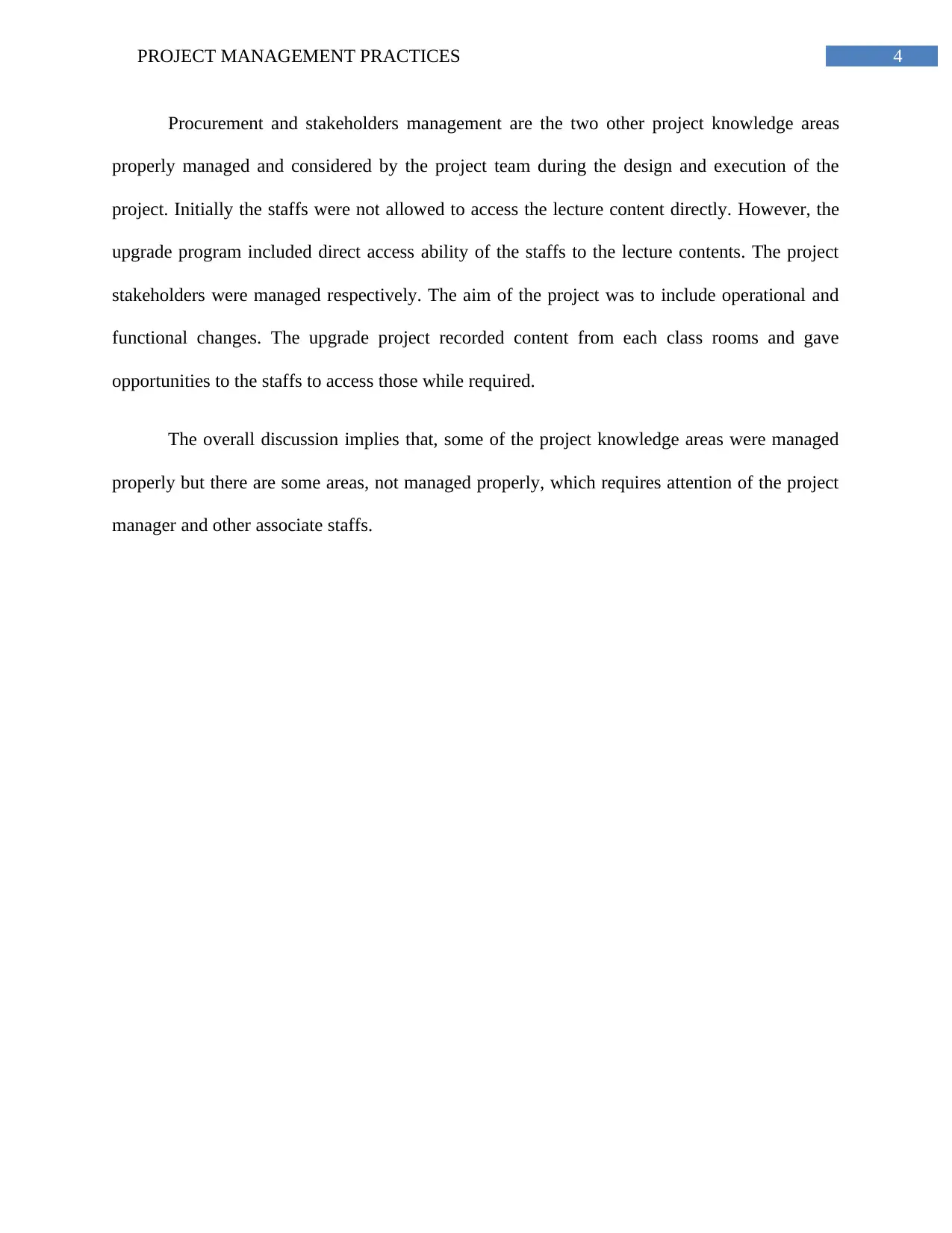
4PROJECT MANAGEMENT PRACTICES
Procurement and stakeholders management are the two other project knowledge areas
properly managed and considered by the project team during the design and execution of the
project. Initially the staffs were not allowed to access the lecture content directly. However, the
upgrade program included direct access ability of the staffs to the lecture contents. The project
stakeholders were managed respectively. The aim of the project was to include operational and
functional changes. The upgrade project recorded content from each class rooms and gave
opportunities to the staffs to access those while required.
The overall discussion implies that, some of the project knowledge areas were managed
properly but there are some areas, not managed properly, which requires attention of the project
manager and other associate staffs.
Procurement and stakeholders management are the two other project knowledge areas
properly managed and considered by the project team during the design and execution of the
project. Initially the staffs were not allowed to access the lecture content directly. However, the
upgrade program included direct access ability of the staffs to the lecture contents. The project
stakeholders were managed respectively. The aim of the project was to include operational and
functional changes. The upgrade project recorded content from each class rooms and gave
opportunities to the staffs to access those while required.
The overall discussion implies that, some of the project knowledge areas were managed
properly but there are some areas, not managed properly, which requires attention of the project
manager and other associate staffs.

5PROJECT MANAGEMENT PRACTICES
References
Chakra, H. A., Tannir, A., & Ashi, A. T. (2017). Validating the Integration among Project
Management Knowledge Areas in Lebanon. International Journal of Innovation,
Management and Technology, 8(1), 38.
Cheng, J. K., Malik, Z. A., & Sorooshian, S. (2017). Understanding the Interrelationship
Between Different Knowledge Areas in PMBOK Through the Development of System
Dynamics Model. The Social Sciences, 12(3), 473-481.
Crawford, L. H., BA, H., & Stretton, A. M. (2018). Bodies of Knowledge and Competency
Standards in Global Project Management. The AMA Handbook of Project Management.
Dumrak, J., Baroudi, B., & Hadjinicolaou, N. (2017). Exploring the association between project
management knowledge areas and sustainable outcomes. Procedia Engineering, 182,
157-164.
Gonçalves, R. Q., von Wangenheim, C. A. G., Hauck, J. C., & Zanella, A. (2017). An
instructional feedback technique for teaching project management tools aligned with
PMBOK. IEEE Transactions on Education, 61(2), 143-150.
Kerzner, H. 2017. Project management: a systems approach to planning, scheduling, and
controlling. John Wiley and Sons.
Varajão, J. (2016). Success Management as a PM knowledge area–work-in-progress. Procedia
Computer Science, 100, 1095-1102.
References
Chakra, H. A., Tannir, A., & Ashi, A. T. (2017). Validating the Integration among Project
Management Knowledge Areas in Lebanon. International Journal of Innovation,
Management and Technology, 8(1), 38.
Cheng, J. K., Malik, Z. A., & Sorooshian, S. (2017). Understanding the Interrelationship
Between Different Knowledge Areas in PMBOK Through the Development of System
Dynamics Model. The Social Sciences, 12(3), 473-481.
Crawford, L. H., BA, H., & Stretton, A. M. (2018). Bodies of Knowledge and Competency
Standards in Global Project Management. The AMA Handbook of Project Management.
Dumrak, J., Baroudi, B., & Hadjinicolaou, N. (2017). Exploring the association between project
management knowledge areas and sustainable outcomes. Procedia Engineering, 182,
157-164.
Gonçalves, R. Q., von Wangenheim, C. A. G., Hauck, J. C., & Zanella, A. (2017). An
instructional feedback technique for teaching project management tools aligned with
PMBOK. IEEE Transactions on Education, 61(2), 143-150.
Kerzner, H. 2017. Project management: a systems approach to planning, scheduling, and
controlling. John Wiley and Sons.
Varajão, J. (2016). Success Management as a PM knowledge area–work-in-progress. Procedia
Computer Science, 100, 1095-1102.
⊘ This is a preview!⊘
Do you want full access?
Subscribe today to unlock all pages.

Trusted by 1+ million students worldwide
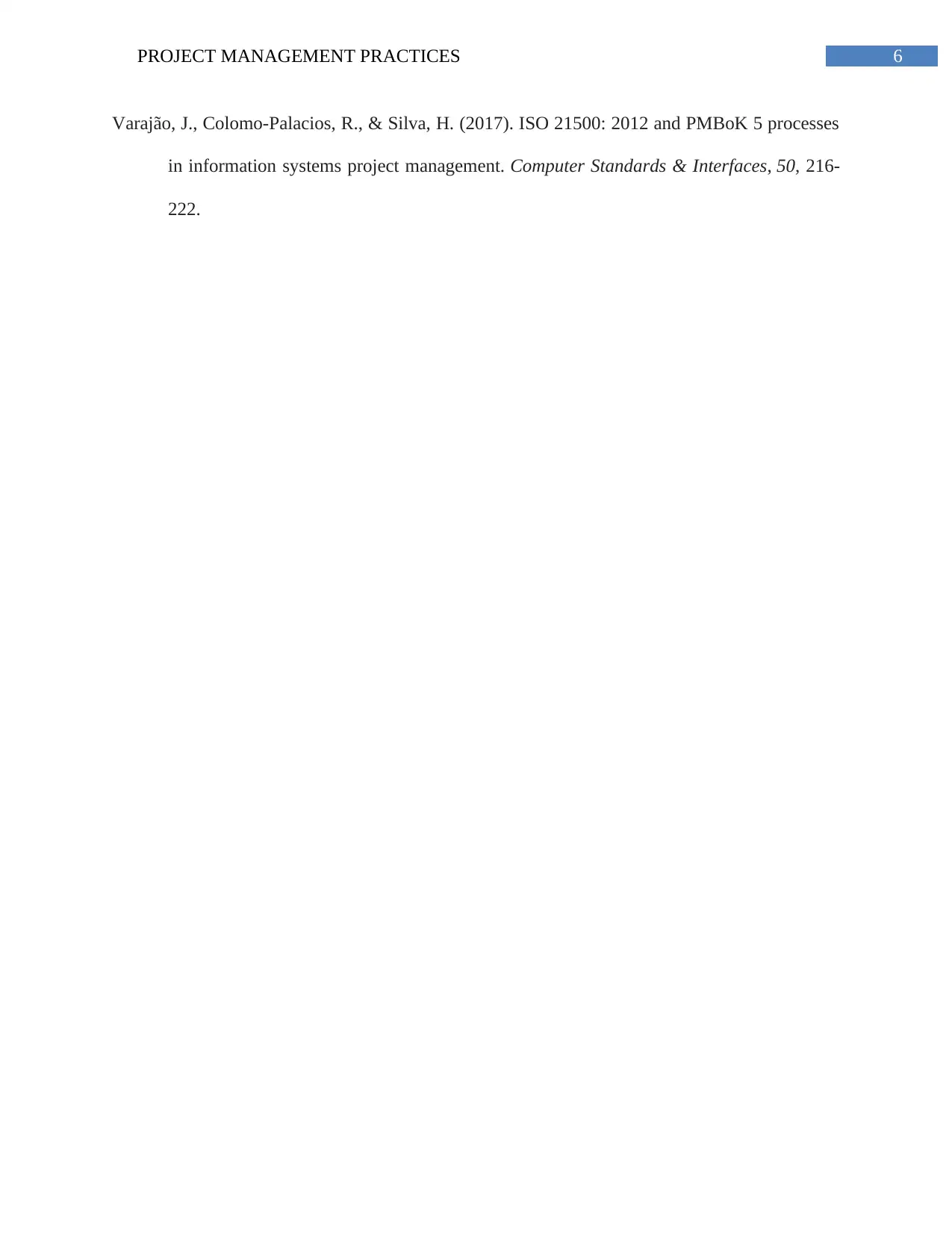
6PROJECT MANAGEMENT PRACTICES
Varajão, J., Colomo-Palacios, R., & Silva, H. (2017). ISO 21500: 2012 and PMBoK 5 processes
in information systems project management. Computer Standards & Interfaces, 50, 216-
222.
Varajão, J., Colomo-Palacios, R., & Silva, H. (2017). ISO 21500: 2012 and PMBoK 5 processes
in information systems project management. Computer Standards & Interfaces, 50, 216-
222.
1 out of 7
Related Documents
Your All-in-One AI-Powered Toolkit for Academic Success.
+13062052269
info@desklib.com
Available 24*7 on WhatsApp / Email
![[object Object]](/_next/static/media/star-bottom.7253800d.svg)
Unlock your academic potential
Copyright © 2020–2025 A2Z Services. All Rights Reserved. Developed and managed by ZUCOL.





